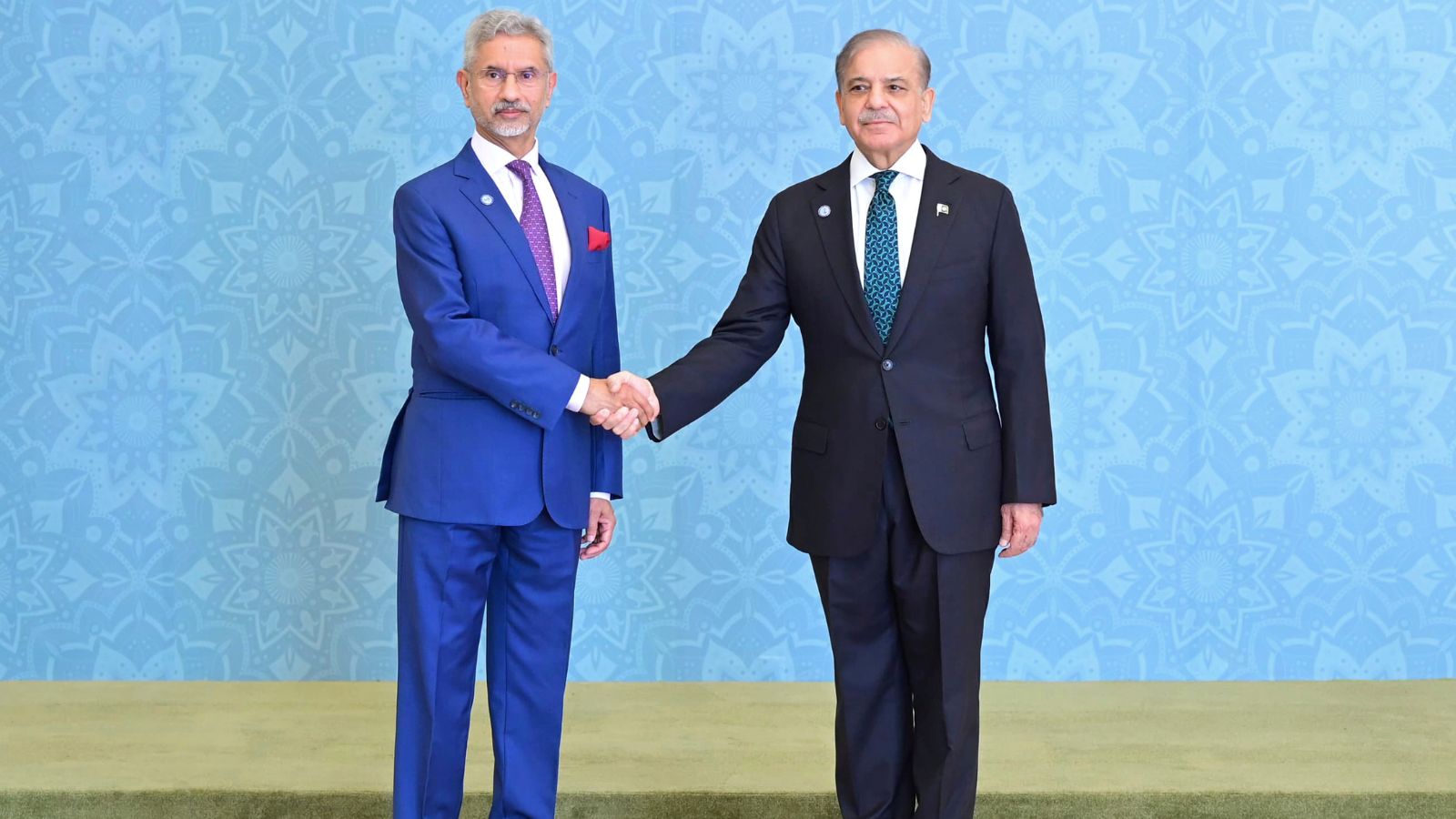Stay updated with the latest - Click here to follow us on Instagram
As India opposes China’s Belt & Road Initiative, Pakistan says ‘don’t look through narrow political prism’
India on Wednesday once again refused to endorse China's ambitious 'One Belt One Road' initiative, becoming the only country in the SCO to not support the controversial connectivity project.
 External Affairs Minister S Jaishankar with Pakistani Prime Minister Shehbaz Sharif as he arrives to attend Shanghai Cooperation Organization (SCO) meeting, in Islamabad, Pakistan. (AP)
External Affairs Minister S Jaishankar with Pakistani Prime Minister Shehbaz Sharif as he arrives to attend Shanghai Cooperation Organization (SCO) meeting, in Islamabad, Pakistan. (AP)As India strongly reiterated its opposition to China’s Belt and Road Initiative (BRI) at the Shanghai Cooperation Organisation (SCO) summit, Pakistan Prime Minister Shehbaz Sharif Wednesday urged the member states to not view such connectivity projects through a “narrow political prism.”
His remarks came as an apparent criticism of India’s long-standing refusal to endorse the initiative, particularly the China-Pakistan Economic Corridor (CPEC), which passes through Pakistan-occupied Kashmir (PoK).
Sharif, in his opening address, stressed the importance of expanding projects like the BRI and CPEC for regional connectivity. “Let us not look at such projects through the narrow political prism, and invest in our collective connectivity capacities which are crucial to advancing the shared vision of an economically integrated region,” he said. He called for a more cooperative approach to connectivity that could enhance the socio-economic progress of the entire SCO region.
India on Wednesday once again refused to endorse China’s ambitious ‘One Belt One Road’ initiative, becoming the only country in the SCO to not support the controversial connectivity project.
External Affairs Minister S Jaishankar made India’s stance clear during his address, indirectly referring to the project by emphasising the importance of sovereignty and territorial integrity in trade and connectivity initiatives. “Collaborative connectivity can create new efficiencies,” he said, but added that these projects must not compromise the sovereignty of nations. He also raised concerns about the debt implications of such projects, without directly naming China.
 Pakistan’s Prime Minister Shehbaz Sharif, center, with China’s Premier Li Qiang, fifth left, Belarus Prime Minister Roman Golovchenko, fourth left, Russian Prime Minister Mikhail Mishustin, and other leaders at the opening session of Shanghai Cooperation Organization (SCO) meeting in Islamabad. (AP)
Pakistan’s Prime Minister Shehbaz Sharif, center, with China’s Premier Li Qiang, fifth left, Belarus Prime Minister Roman Golovchenko, fourth left, Russian Prime Minister Mikhail Mishustin, and other leaders at the opening session of Shanghai Cooperation Organization (SCO) meeting in Islamabad. (AP)
India has consistently refused to endorse the BRI in previous SCO conclaves, and this summit was no exception. India’s refusal stands in stark contrast to the joint communique released at the end of the summit, where all other SCO member states — Russia, Belarus, Iran, Kazakhstan, Kyrgyzstan, Pakistan, Tajikistan, and Uzbekistan —reaffirmed their support for the Chinese initiative. The communique noted the ongoing efforts to link the Eurasian Economic Union with the BRI, and expressed optimism about implementing the SCO Economic Development Strategy through 2030.
India’s resistance stems primarily from its objections to the CPEC, which it claims violates its territorial integrity by running through Pakistan-occupied Kashmir (PoK). This year’s SCO conclave marked yet another instance where India stood alone in its dissent within the organisation, underscoring the growing geopolitical tensions surrounding China’s expansive infrastructure project.
 In this photo released by the Press Information Department, Pakistan’s Prime Minister Shehbaz Sharif, center, delivers his speech at the opening session of Shanghai Cooperation Organization (SCO) meeting, in Islamabad, Pakistan, Wednesday, Oct. 16, 2024. (Press Information Department via AP)
In this photo released by the Press Information Department, Pakistan’s Prime Minister Shehbaz Sharif, center, delivers his speech at the opening session of Shanghai Cooperation Organization (SCO) meeting, in Islamabad, Pakistan, Wednesday, Oct. 16, 2024. (Press Information Department via AP)
Pakistan’s advocacy and regional issues
In contrast to India’s position, Sharif called for strengthening regional connectivity through the BRI and highlighted the potential of Afghanistan as a hub for trade and transit. He urged the Taliban government to ensure that Afghan territory is not used for terrorism against its neighbours, reflecting the broader security concerns shared by SCO members.
Sharif also used the platform to address the ongoing crisis in Gaza, condemning Israeli attacks and calling for an immediate and unconditional ceasefire. “We cannot ignore the ongoing genocide in Gaza,” he said, urging the international community to support the establishment of a Palestinian state based on pre-1967 borders, with East Jerusalem as its capital.
With PTI inputs
- 01
- 02
- 03
- 04
- 05































